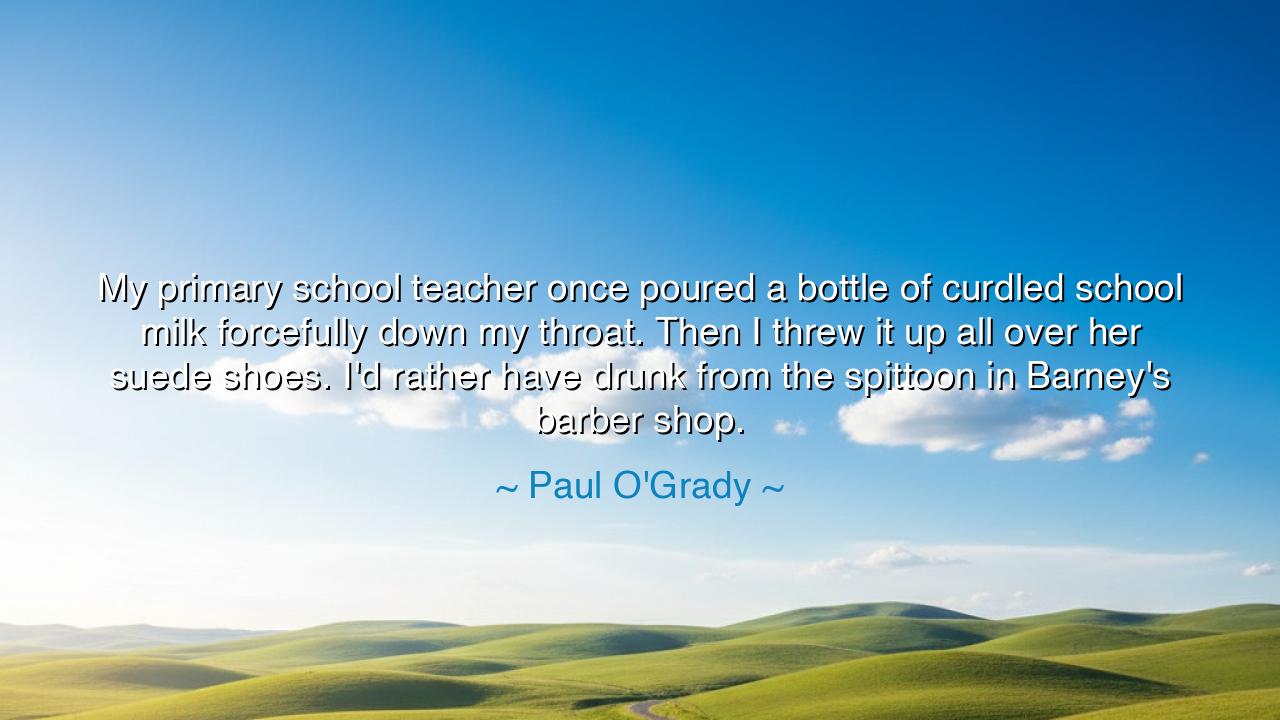
My primary school teacher once poured a bottle of curdled school
My primary school teacher once poured a bottle of curdled school milk forcefully down my throat. Then I threw it up all over her suede shoes. I'd rather have drunk from the spittoon in Barney's barber shop.






Paul O’Grady, the wit and storyteller whose tongue was sharpened by both hardship and humor, once recalled with raw honesty: “My primary school teacher once poured a bottle of curdled school milk forcefully down my throat. Then I threw it up all over her suede shoes. I'd rather have drunk from the spittoon in Barney's barber shop.” At first glance, this seems a tale told for laughter, yet within it lies a deeper meditation on dignity, defiance, and the absurdity of authority when it loses its humanity. For the image of a child forced to consume what is spoiled becomes a symbol of every soul compelled to endure what it knows in its heart to be wrong.
The origin of this memory rests in O’Grady’s own youth, in a time when discipline in schools was often harsh, and children’s voices were silenced beneath the weight of authority. Milk, once seen as nourishment for the young, had curdled, and yet the teacher—clinging to rules rather than compassion—demanded obedience at any cost. The result was humiliation not for the child, but for the adult, as the spoiled milk found its way back upon her fine suede shoes. In this reversal, there is poetic justice: the body itself rejected what the spirit could not willingly endure.
History offers us echoes of such defiance. Consider the story of Diogenes the Cynic, who, when Alexander the Great offered to grant him any wish, replied only: “Stand out of my sunlight.” In that moment, Diogenes refused to bow to power or grandeur, preferring the truth of nature to the false gifts of kings. Likewise, O’Grady as a child, though powerless, revealed a greater truth—that obedience without reason is folly, and that sometimes resistance comes not through words, but through the body itself, through the refusal of the spirit to digest what is unfit.
The meaning of O’Grady’s words is deeply emotional and evocative. He speaks not only of spoiled milk, but of the spoiled nature of authority when it forgets compassion. He mocks it with humor—preferring even the filth of a spittoon to the false nourishment forced upon him. In this way, humor becomes a weapon of the oppressed, transforming pain into laughter, shame into triumph. His story is not of bitterness, but of reclamation: he took what was once humiliation and turned it into a tale of defiance, told with laughter that outlived the memory of cruelty.
There is also a heroic lesson in this tale. It reminds us that authority must be tempered with humanity, and that force without care breeds rebellion, whether in schools, in homes, or in nations. Just as spoiled milk cannot nourish, so too laws or rules without justice cannot sustain the soul. When leaders impose what is rotten, they may demand obedience, but in the end, the truth will reveal itself, often to their embarrassment. The shoes of false authority, no matter how fine, cannot escape the stain of their own arrogance.
The lesson for us is clear: do not force upon others what is spoiled, whether in word, in action, or in spirit. Nourish with kindness, not compulsion. And when you find yourself in the place of the child, confronted with injustice, remember that resistance can take many forms: sometimes bold words, sometimes quiet refusal, sometimes laughter that exposes the folly of those who claim power. As O’Grady shows, even the smallest act of rejection can become, in time, a story of strength.
Practically, this means we must be vigilant in our own roles as teachers, parents, leaders, or friends. Let us not cling to rules for their own sake, but to truth and compassion. Let us listen to those who are small and voiceless, for their instincts may see more clearly than the pride of the powerful. And when we face what is rotten in our own lives—whether ideas, habits, or authorities—we must find the courage to spit it out, to refuse it, and to laugh at its absurdity.
Thus Paul O’Grady’s tale, told in jest, becomes a parable: better to endure humiliation and laugh, than to swallow what is spoiled and be silent. From the curdled bottle and the stained shoes emerges a wisdom that defies fear: never accept blindly what the world forces upon you; trust your instincts, resist the rotten, and in the end, let laughter be your victory.






AAdministratorAdministrator
Welcome, honored guests. Please leave a comment, we will respond soon